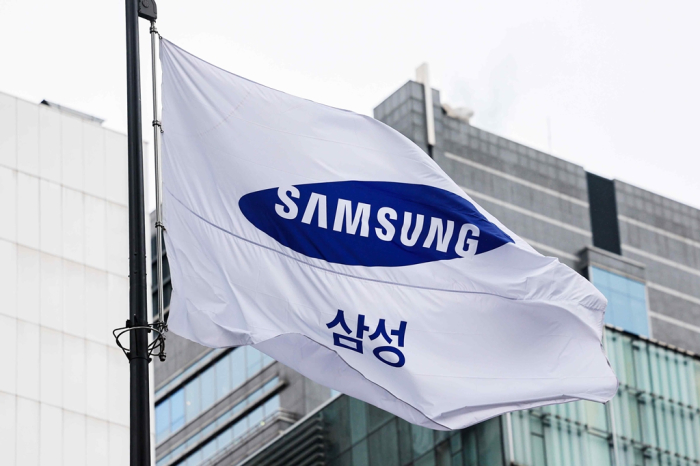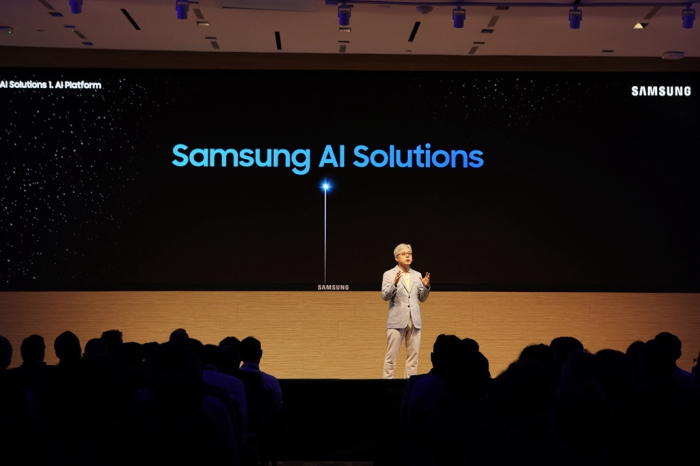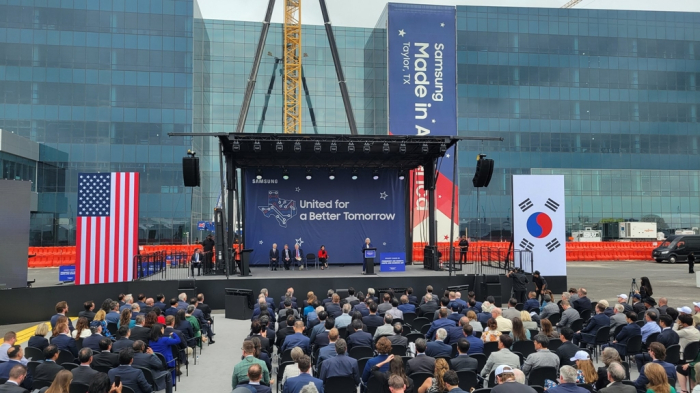Samsung seeks $3.6 billion in loans from KDB for chip investment
With the borrowing, Samsung hopes to better compete with foundry leader TSMC and HBM leader SK Hynix
By Jun 26, 2024 (Gmt+09:00)
Samsung steps up AR race with advanced microdisplay for smart glasses


When in S. Korea, it’s a ritual: Foreigners make stops at CU, GS25, 7-Eleven


Maybe Happy Ending: A robot love story that rewrote Broadway playbook


NPS yet to schedule external manager selection; PE firms’ fundraising woes deepen


US auto parts tariffs take effect; Korea avoids heavy hit



South Korean tech giant Samsung Electronics Co. seeks to borrow as much as 5 trillion won ($3.6 billion) from the state-run Korea Development Bank to finance its projects to build more chip production facilities in Korea and abroad.
Samsung, the world’s largest memory chipmaker, is in final-stage talks with the KDB over the exact size of its borrowing and interest rates, people familiar with the matter said on Wednesday.
The loans are part of a low-interest 17 trillion won lending scheme the government plans to put into operation from next month to support the domestic semiconductor industry.
Sources said that SK Hynix Inc., Samsung’s crosstown rival and the world’s second-largest memory chipmaker, is also considering borrowing as much as 3 trillion won from the KDB for its chip investment.
The state-run bank is ready to extend up to 5 trillion won to Samsung at an interest rate of about 3.5% per year, they said.

If concluded, Samsung would be borrowing massive funds for the first time in two decades.
Samsung has for years been running the company without borrowing but recently changed its management style as it needs to spend heavily to compete with rivals such as Taiwan Semiconductor Manufacturing Co. (TSMC), the world’s top foundry or contract chipmaking company, amid the artificial intelligence (AI) chip boom.
In February 2023. Samsung borrowed 21.99 trillion won at an annual interest rate of 4.6% from its affiliate Samsung Display Co.
MULLING FIRST CORPORATE BOND ISSUE SINCE 2001
Samsung is also considering issuing corporate bonds in Korea and abroad.
Company officials recently contacted Korean and foreign brokerage firms to tap the possibility of issuing corporate bonds in Korea and global bonds abroad, according to investment banking sources.

Samsung Electronics last issued corporate bonds worth 500 billion won in the domestic market in October 2001.
In overseas markets, the chipmaker sold $1 billion in five-year global bonds with an interest rate 0.8 percentage point above the benchmark rate for five-year US Treasury bonds in April 2012.
Samsung has been spending heavily over the past years to catch up to TSMC, which controls 62% of the global foundry market. Samsung is a distant second with a low double-digit market share.
SIX CHIP PLANTS IN KOREA, ONE IN TAYLOR, TEXAS
Samsung Electronics had 121.8 trillion won in cash and cash equivalents at the end of 2020.
However, its cash is dwindling rapidly.
The company’s cash and cash equivalents fell to 91.7 trillion won at the end of 2023.
Last year, Samsung spent 48.3 trillion won and 20.2 trillion won on facility investment and R&D projects, respectively, although its chip business posted deep deficits.

With the funds raised through the KDB borrowing and corporate bond issue, Samsung plans to build state-of-the-art chip facilities in Korea and abroad.
The company has been building six chip plants in Pyeongtaek, Gyeonggi Province, since 2022 at a total cost of some 200 trillion won.
Samsung has completed the construction of three factories for advanced DRAM and NAND chips and contract chipmaking at its Pyeongtaek complex.
In the US, it is building a $17 billion advanced foundry plant in Taylor, Texas.
Taylor, a town in Williamson County, is about 25 km from Austin, where its current contract-manufacturing operations are located.
The world’s two largest foundry chipmakers, TSMC and Samsung, have been upping the ante in their quest for global leadership by aggressively expanding their facilities in the US.
More recently, Samsung faces an uphill battle against SK Hynix in AI chips, called high-bandwidth memory (HBM).
Although Samsung is the industry’s top memory chipmaker, it falls far behind SK Hynix in the HBM segment.
According to Taiwan-based market researcher TrendForce, SK Hynix dominates the HBM sector with 53% market share as of end-2023, followed by Samsung’s 38%.
SK Hynix is the only Korean supplier of advanced HBM3 chips to Nvidia Corp., which controls over 80% of the market for graphics processing units (GPUs), the core of AI computing tasks.
Write to Eui-Myung Park, Hyun-Woo Kang and Ik-Hwan Kim at uimyung@hankyung.com
In-Soo Nam edited this article.
-
 Korean chipmakersSamsung unveils new foundry tech; AI chip sales to rise ninefold
Korean chipmakersSamsung unveils new foundry tech; AI chip sales to rise ninefoldJun 13, 2024 (Gmt+09:00)
4 Min read -
 Korean chipmakersSK Hynix works on next-generation HBM chip supply plans for 2025
Korean chipmakersSK Hynix works on next-generation HBM chip supply plans for 2025May 30, 2024 (Gmt+09:00)
3 Min read -
 Executive reshufflesSamsung Electronics replaces chip head amid HBM crisis
Executive reshufflesSamsung Electronics replaces chip head amid HBM crisisMay 21, 2024 (Gmt+09:00)
4 Min read -
 Korean chipmakersSK Hynix, Samsung set to benefit from explosive HBM sales growth
Korean chipmakersSK Hynix, Samsung set to benefit from explosive HBM sales growthMay 07, 2024 (Gmt+09:00)
3 Min read -
 Korean chipmakersSamsung shifts gears to focus on HBM, server memory chips
Korean chipmakersSamsung shifts gears to focus on HBM, server memory chipsApr 30, 2024 (Gmt+09:00)
3 Min read -
 Korean chipmakersSamsung set to triple HBM output in 2024 to lead AI chip era
Korean chipmakersSamsung set to triple HBM output in 2024 to lead AI chip eraMar 27, 2024 (Gmt+09:00)
3 Min read -
 Korean chipmakersSamsung’s $17 billion new chip plant in Taylor aims to rein in TSMC
Korean chipmakersSamsung’s $17 billion new chip plant in Taylor aims to rein in TSMCNov 24, 2021 (Gmt+09:00)
4 Min read


